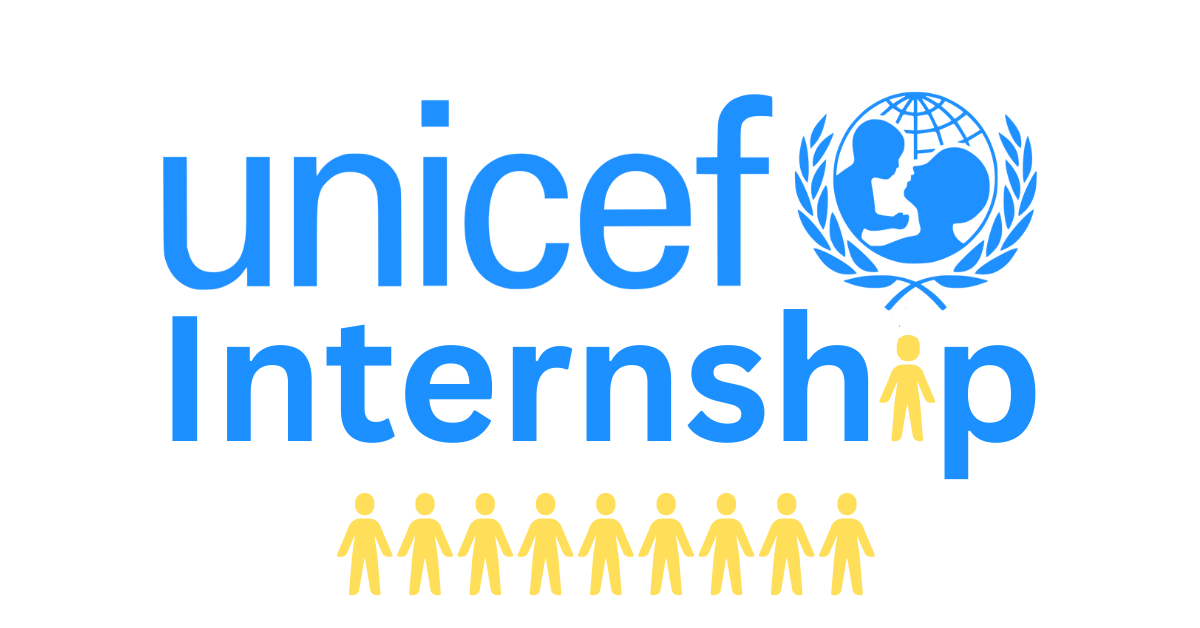The UNICEF Internship on Climate Resilience 2026 offers a fully funded, hands-on experience for students and recent graduates eager to contribute to global efforts addressing climate change. This program empowers young professionals to engage with real-world challenges, build resilience in vulnerable communities, and gain professional exposure in the international development sector.
Applications are now open, and this internship is an excellent stepping stone for future leaders in climate action, humanitarian work, and sustainable development.
About the UNICEF Internship on Climate Resilience 2026
UNICEF’s Climate Resilience Internship is designed to equip young professionals with the skills, experience, and global exposure necessary to address the complex challenges posed by climate change. Interns will contribute to initiatives aimed at reducing climate-related vulnerabilities, protecting children in climate-sensitive contexts, and promoting sustainable development practices.
By joining this internship, participants can expect to:
- Develop practical skills in climate resilience, project management, and international development.
- Work alongside UNICEF experts, gaining mentorship and guidance from professionals in the field.
- Gain exposure to real-world projects, research, and policy formulation in climate adaptation and disaster risk reduction.
- Contribute meaningfully to global development goals, particularly the Sustainable Development Goals (SDGs).
Why Choose This Internship?
This internship is not just a learning opportunity; it is a career accelerator. The program offers:
1. Full Funding
UNICEF provides a monthly stipend and covers essential costs, including travel support, making this internship accessible to candidates worldwide.
2. Global Exposure
Interns work with UNICEF teams and partners internationally, gaining a deep understanding of how climate initiatives are implemented across different cultural and geographic contexts.
3. Professional Mentorship
Participants receive guidance from senior professionals in climate science, sustainable development, and humanitarian work, helping interns navigate their career path.
4. Flexible Placement
Interns are placed according to project needs, location availability, and their area of expertise. Placements may be in UNICEF offices worldwide or remote, depending on the project.
5. Hands-on Experience
Interns work directly on climate resilience projects, supporting program implementation, research, and advocacy initiatives.
Key Responsibilities
Interns in the Climate Resilience program are actively involved in various aspects of UNICEF’s climate initiatives. Responsibilities include:
Research & Reporting
- Conduct research on climate adaptation, disaster risk reduction, and community resilience.
- Develop reports, policy briefs, and analytical documents to inform UNICEF programs.
- Analyze climate data to assess risks, impacts, and potential solutions for vulnerable communities.
Program Implementation & Monitoring
- Support ongoing UNICEF climate projects at local, national, or global levels.
- Assist in monitoring project outcomes and evaluating impact.
- Collaborate with teams to ensure projects meet timelines, quality standards, and stakeholder expectations.
Advocacy & Awareness
- Participate in campaigns promoting climate action and climate justice.
- Assist in developing communication materials for government agencies, NGOs, and community groups.
- Engage in public awareness efforts to highlight the importance of climate resilience, particularly for children.
Stakeholder Engagement
- Collaborate with local communities, civil society organizations, and international partners.
- Support community workshops, training sessions, and awareness programs on climate adaptation and resilience.
- Gather feedback from stakeholders to improve program design and implementation.
Administrative & Technical Support
- Provide logistical, administrative, and technical support to project teams.
- Assist with documentation, reporting, and project coordination activities.
Eligibility & Qualifications
To qualify for the UNICEF Climate Resilience Internship, candidates must meet the following criteria:
Education & Certification
- Enrolled in or recently graduated from a Bachelor’s or Master’s degree program in Environmental Studies, Climate Science, Development Studies, Social Sciences, or related fields.
- Strong academic record demonstrating research and analytical skills.
- Additional certifications in sustainability, climate action, or disaster risk management are a plus.
Skills & Experience
- Previous experience in research, community engagement, or development projects is preferred but not required.
- Excellent communication, teamwork, analytical, and problem-solving skills.
- Demonstrated interest and passion for climate resilience, sustainable development, and humanitarian work.
Benefits of the Internship
Participating in this internship provides both financial and professional advantages:
Financial Support
- A competitive stipend to cover living expenses.
- Travel support and coverage for other necessary costs related to the internship.
Mentorship & Networking
- Guidance from senior UNICEF staff and global experts.
- Networking opportunities with professionals in climate action, development, and humanitarian sectors.
Skill Development
- Practical experience in climate resilience, research, project management, and stakeholder engagement.
- Exposure to international standards, methodologies, and best practices in climate adaptation and disaster risk reduction.
Career Advancement
- Valuable international experience enhancing employability in NGOs, international organizations, government agencies, and research institutions.
- A recognized platform to launch a career in climate, development, and humanitarian fields.
Internship Duration & Location
- The internship typically lasts between 6 to 26 weeks.
- Placements may be full-time or part-time, depending on project requirements.
- Interns can be placed in UNICEF offices worldwide or remotely, depending on the nature of the project and geographical needs.
Real Impact: Past Intern Projects
Example 1: Climate Resilience Research in Coastal Communities
Interns worked on assessing the vulnerability of children and families in coastal areas prone to flooding. They conducted surveys, gathered climate data, and prepared reports to guide UNICEF interventions.
Example 2: Climate Education Programs
Interns contributed to designing community-based educational programs that raised awareness on sustainable practices, renewable energy, and disaster preparedness.
Example 3: Policy and Advocacy Support
Interns assisted in drafting policy briefs advocating for climate-resilient school infrastructure and child-centered disaster response strategies in regions affected by extreme weather.
Example 4: Innovative Solutions for Resilience
Some interns supported projects introducing innovative technologies for early warning systems, community risk mapping, and climate-smart agriculture initiatives.
These experiences demonstrate how interns make tangible contributions while gaining practical skills applicable to future careers in climate resilience and development.
Career Paths After Internship
Completing the UNICEF Climate Resilience Internship opens multiple career pathways:
- International Development Specialist – Working with global organizations, NGOs, or government agencies to develop climate resilience projects.
- Climate Policy Analyst – Advising policymakers on strategies to reduce climate risk and improve adaptation measures.
- Researcher in Climate & Environmental Science – Conducting applied research on climate adaptation, mitigation, and sustainability.
- Humanitarian Program Manager – Leading projects that support vulnerable populations during climate-induced disasters.
- Advocacy & Communications Officer – Promoting climate action campaigns, community awareness, and policy advocacy at local and international levels.
Application Process
Step 1: Prepare Your Documents
- CV highlighting academic achievements, research, and relevant projects.
- Cover letter demonstrating motivation and suitability for the internship.
- Academic transcripts and relevant certifications.
Step 2: Submit Your Application
- Applications must be submitted through UNICEF’s official portal.
Step 3: Selection
- Shortlisted candidates will be invited for interviews or assessments.
- Final selections are communicated with an official offer letter, internship details, and stipend information.
Related Posts
- [UNDP Global Internship 2026 – Fully Funded Graduate Programme]
- [GIZ Entry-Level Programs 2026 – Fully Funded Internships]
- [UNESCO Freelance Consultant Roles 2026 – Paid Global Opportunities]
- [Mercy Corps Global Fellowship 2026 – Fully Funded Training & Stipend]
- [UN Volunteer Assignments 2026 – 100% Remote Opportunities]
Follow Our Social Media Pages
Join Our WhatsApp Group
Join Our WhatsApp Channel
Follow Our Facebook Page
Tips for a Strong Application
- Tailor Your CV and Cover Letter – Highlight relevant coursework, projects, and volunteer experience.
- Showcase Passion – Demonstrate your commitment to climate resilience, child protection, and sustainable development.
- Provide Evidence of Skills – Include examples of research, data analysis, project coordination, or advocacy work.
- Highlight Teamwork and Communication – Strong interpersonal skills are crucial for global assignments.
- Include Certifications – If you have additional certifications in climate, sustainability, or disaster risk management, include them.
Frequently Asked Questions (FAQs)
1. Who is eligible to apply?
- Students enrolled or recent graduates from relevant Bachelor’s or Master’s programs.
2. Is the internship paid?
- Yes, it is fully funded, including a monthly stipend and travel support.
3. Can I apply if I live outside my home country?
- Yes, the internship is open to international applicants.
4. How long is the internship?
- Typically 6 to 26 weeks depending on project placement.
5. What will I learn?
- Practical skills in research, project management, stakeholder engagement, and climate resilience strategies.
6. Are there language requirements?
- Proficiency in English is required; additional UNICEF working languages (French, Spanish) may be an advantage.
7. How do I apply?
- Submit your CV, cover letter, and academic transcripts through UNICEF’s official portal.
8. Is prior work experience required?
- Not mandatory, though research or community engagement experience is preferred.
Final Thoughts
The UNICEF Climate Resilience Internship 2026 is a remarkable opportunity for young professionals to gain meaningful international experience, contribute to climate action, and strengthen their career prospects in global development. It equips participants with the skills, knowledge, and networks needed to tackle some of the world’s most pressing climate challenges.
This fully funded program provides practical experience, mentorship, and exposure to innovative projects, ensuring that interns leave with the tools to make a real-world impact.
Keywords: UNICEF Internship 2026, UNICEF Climate Resilience Internship, fully funded internships 2026, international development internships, global internship opportunities, climate action internships, paid internships for graduates, humanitarian internships 2026, youth climate opportunities, sustainable development internships, climate resilience programs, research internships UNICEF, climate adaptation internship, UN internships 2026, climate change youth programs








[…] UNICEF Climate Resilience Internship 2026 – Paid Global Opportunity for Graduates […]
[…] UNICEF Climate Resilience Internship 2026 – Paid Global Opportunity for Graduates […]
[…] UNICEF Climate Resilience Internship 2026 – Paid Global Opportunity for Graduates […]
[…] UNICEF Climate Resilience Internship 2026 – Paid Global Opportunity for Graduates […]
I am Ziaur Rahman job stil now brac international tuberculosis programme Teknaf sadar godarbill 01/10/2024-stil now
How and where to apply?
Internship
[…] UNICEF Climate Resilience Internship 2026 – Paid Global Opportunity for Graduates […]
[…] UNICEF Climate Resilience Internship 2026 – Paid Global Opportunity for Graduates […]
[…] UNICEF Climate Resilience Internship 2026 – Paid Global Opportunity for Graduates […]
[…] UNICEF Climate Resilience Internship 2026 – Paid Global Opportunity for Graduates […]
[…] UNICEF Climate Resilience Internship 2026 – Paid Global Opportunity for Graduates […]
[…] UNICEF Climate Resilience Internship 2026 – Paid Global Opportunity for Graduates […]
[…] UNICEF Climate Resilience Internship 2026 – Paid Global Opportunity for Graduates […]
[…] UNICEF Climate Resilience Internship 2026 – Paid Global Opportunity for Graduates […]
[…] UNICEF Climate Resilience Internship 2026 – Paid Global Opportunity for Graduates […]
[…] UNICEF Climate Resilience Internship 2026 – Paid Global Opportunity for Graduates […]
[…] UNICEF Climate Resilience Internship 2026 – Paid Global Opportunity for Graduates […]
[…] UNICEF Climate Resilience Internship 2026 – Paid Global Opportunity for Graduates […]
[…] UNICEF Climate Resilience Internship 2026 – Paid Global Opportunity for Graduates […]
[…] UNICEF Climate Resilience Internship 2026 – Paid Global Opportunity for Graduates […]
[…] UNICEF Climate Resilience Internship 2026 – Paid Global Opportunity for Graduates […]
[…] UNICEF Climate Resilience Internship 2026 – Paid Global Opportunity for Graduates […]
[…] UNICEF Climate Resilience Internship 2026 – Paid Global Opportunity for Graduates […]
[…] UNICEF Climate Resilience Internship 2026 – Paid Global Opportunity for Graduates […]
[…] UNICEF Climate Resilience Internship 2026 – Paid Global Opportunity for Graduates […]
[…] UNICEF Climate Resilience Internship 2026 – Paid Global Opportunity for Graduates […]
[…] UNICEF Climate Resilience Internship 2026 – Paid Global Opportunity for Graduates […]
[…] UNICEF Climate Resilience Internship 2026 – Paid Global Opportunity for Graduates […]
[…] UNICEF Climate Resilience Internship 2026 – Paid Global Opportunity for Graduates […]
[…] UNICEF Climate Resilience Internship 2026 – Paid Global Opportunity for Graduates […]
[…] UNICEF Climate Resilience Internship 2026 – Paid Global Opportunity for Graduates […]
[…] UNICEF Climate Resilience Internship 2026 – Paid Global Opportunity for Graduates […]
[…] UNICEF Climate Resilience Internship 2026 – Paid Global Opportunity for Graduates […]
[…] UNICEF Climate Resilience Internship 2026 – Paid Global Opportunity for Graduates […]
[…] UNICEF Climate Resilience Internship 2026 – Paid Global Opportunity for Graduates […]
[…] UNICEF Climate Resilience Internship 2026 – Paid Global Opportunity for Graduates […]
[…] UNICEF Climate Resilience Internship 2026 – Paid Global Opportunity for Graduates […]
[…] UNICEF Climate Resilience Internship 2026 – Paid Global Opportunity for Graduates […]
[…] UNICEF Climate Resilience Internship 2026 – Paid Global Opportunity for Graduates […]
[…] UNICEF Climate Resilience Internship 2026 – Paid Global Opportunity for Graduates […]
[…] UNICEF Climate Resilience Internship 2026 – Paid Global Opportunity for Graduates […]
[…] UNICEF Climate Resilience Internship 2026 – Paid Global Opportunity for Graduates […]
[…] UNICEF Climate Resilience Internship 2026 – Paid Global Opportunity for Graduates […]
[…] UNICEF Climate Resilience Internship 2026 – Paid Global Opportunity for Graduates […]
[…] UNICEF Climate Resilience Internship 2026 – Paid Global Opportunity for Graduates […]
[…] UNICEF Climate Resilience Internship 2026 – Paid Global Opportunity for Graduates […]
[…] UNICEF Climate Resilience Internship 2026 – Paid Global Opportunity for Graduates […]
[…] UNICEF Climate Resilience Internship 2026 – Paid Global Opportunity for Graduates […]
[…] UNICEF Climate Resilience Internship 2026 – Paid Global Opportunity for Graduates […]
Invest in Reef
[…] UNICEF Climate Resilience Internship 2026 – Paid Global Opportunity for Graduates […]
[…] UNICEF Climate Resilience Internship 2026 – Paid Global Opportunity for Graduates […]
[…] UNICEF Climate Resilience Internship 2026 – Paid Global Opportunity for Graduates […]
[…] UNICEF Climate Resilience Internship 2026 – Paid Global Opportunity for Graduates […]
[…] UNICEF Climate Resilience Internship 2026 – Paid Global Opportunity for Graduates […]
[…] UNICEF Climate Resilience Internship 2026 – Paid Global Opportunity for Graduates […]
[…] UNICEF Climate Resilience Internship 2026 – Paid Global Opportunity for Graduates […]
[…] UNICEF Climate Resilience Internship 2026 – Paid Global Opportunity for Graduates […]
[…] UNICEF Climate Resilience Internship 2026 – Paid Global Opportunity for Graduates […]
[…] UNICEF Climate Resilience Internship 2026 – Paid Global Opportunity for Graduates […]
[…] UNICEF Climate Resilience Internship 2026 – Paid Global Opportunity for Graduates […]
[…] UNICEF Climate Resilience Internship 2026 – Paid Global Opportunity for Graduates […]
[…] UNICEF Climate Resilience Internship 2026 – Paid Global Opportunity for Graduates […]
[…] UNICEF Climate Resilience Internship 2026 – Paid Global Opportunity for Graduates […]
[…] UNICEF Climate Resilience Internship 2026 – Paid Global Opportunity for Graduates […]
[…] UNICEF Climate Resilience Internship 2026 – Paid Global Opportunity for Graduates […]
[…] UNICEF Climate Resilience Internship 2026 – Paid Global Opportunity for Graduates […]
[…] UNICEF Climate Resilience Internship 2026 – Paid Global Opportunity for Graduates […]
[…] UNICEF Climate Resilience Internship 2026 – Paid Global Opportunity for Graduates […]
[…] UNICEF Climate Resilience Internship 2026 – Paid Global Opportunity for Graduates […]
[…] UNICEF Climate Resilience Internship 2026 – Paid Global Opportunity for Graduates […]
[…] UNICEF Climate Resilience Internship 2026 – Paid Global Opportunity for Graduates […]
[…] UNICEF Climate Resilience Internship 2026 – Paid Global Opportunity for Graduates […]
[…] UNICEF Climate Resilience Internship 2026 – Paid Global Opportunity for Graduates […]
[…] UNICEF Climate Resilience Internship 2026 – Paid Global Opportunity for Graduates […]
[…] UNICEF Climate Resilience Internship 2026 – Paid Global Opportunity for Graduates […]
[…] UNICEF Climate Resilience Internship 2026 – Paid Global Opportunity for Graduates […]
[…] UNICEF Climate Resilience Internship 2026 – Paid Global Opportunity for Graduates […]
[…] UNICEF Climate Resilience Internship 2026 – Paid Global Opportunity for Graduates […]
[…] UNICEF Climate Resilience Internship 2026 – Paid Global Opportunity for Graduates […]
[…] UNICEF Climate Resilience Internship 2026 – Paid Global Opportunity for Graduates […]
[…] UNICEF Climate Resilience Internship 2026 – Paid Global Opportunity for Graduates […]
[…] UNICEF Climate Resilience Internship 2026 – Paid Global Opportunity for Graduates […]
[…] UNICEF Climate Resilience Internship 2026 – Paid Global Opportunity for Graduates […]
[…] UNICEF Climate Resilience Internship 2026 – Paid Global Opportunity for Graduates […]
[…] UNICEF Climate Resilience Internship 2026 – Paid Global Opportunity for Graduates […]
[…] UNICEF Climate Resilience Internship 2026 – Paid Global Opportunity for Graduates […]
[…] UNICEF Climate Resilience Internship 2026 – Paid Global Opportunity for Graduates […]
[…] UNICEF Climate Resilience Internship 2026 – Paid Global Opportunity for Graduates […]
[…] UNICEF Climate Resilience Internship 2026 – Paid Global Opportunity for Graduates […]
[…] UNICEF Climate Resilience Internship 2026 – Paid Global Opportunity for Graduates […]
[…] UNICEF Climate Resilience Internship 2026 – Paid Global Opportunity for Graduates […]
[…] UNICEF Climate Resilience Internship 2026 – Paid Global Opportunity for Graduates […]
[…] UNICEF Climate Resilience Internship 2026 – Paid Global Opportunity for Graduates […]
[…] UNICEF Climate Resilience Internship 2026 – Paid Global Opportunity for Graduates […]
[…] UNICEF Climate Resilience Internship 2026 – Paid Global Opportunity for Graduates […]
[…] UNICEF Climate Resilience Internship 2026 – Paid Global Opportunity for Graduates […]
[…] UNICEF Climate Resilience Internship 2026 – Paid Global Opportunity for Graduates […]
[…] UNICEF Climate Resilience Internship 2026 – Paid Global Opportunity for Graduates […]
[…] UNICEF Climate Resilience Internship 2026 – Paid Global Opportunity for Graduates […]
[…] UNICEF Climate Resilience Internship 2026 – Paid Global Opportunity for Graduates […]
[…] UNICEF Climate Resilience Internship 2026 – Paid Global Opportunity for Graduates […]
[…] UNICEF Climate Resilience Internship 2026 – Paid Global Opportunity for Graduates […]
[…] UNICEF Climate Resilience Internship 2026 – Paid Global Opportunity for Graduates […]
[…] UNICEF Climate Resilience Internship 2026 – Paid Global Opportunity for Graduates […]
[…] UNICEF Climate Resilience Internship 2026 – Paid Global Opportunity for Graduates […]
[…] UNICEF Climate Resilience Internship 2026 – Paid Global Opportunity for Graduates […]
[…] UNICEF Climate Resilience Internship 2026 – Paid Global Opportunity for Graduates […]
[…] UNICEF Climate Resilience Internship 2026 – Paid Global Opportunity for Graduates […]
[…] UNICEF Climate Resilience Internship 2026 – Paid Global Opportunity for Graduates […]
[…] UNICEF Climate Resilience Internship 2026 – Paid Global Opportunity for Graduates […]
[…] UNICEF Climate Resilience Internship 2026 – Paid Global Opportunity for Graduates […]
[…] UNICEF Climate Resilience Internship 2026 – Paid Global Opportunity for Graduates […]
[…] UNICEF Climate Resilience Internship 2026 – Paid Global Opportunity for Graduates […]
[…] UNICEF Climate Resilience Internship 2026 – Paid Global Opportunity for Graduates […]
[…] UNICEF Climate Resilience Internship 2026 – Paid Global Opportunity for Graduates […]
[…] UNICEF Climate Resilience Internship 2026 – Paid Global Opportunity for Graduates […]
[…] UNICEF Climate Resilience Internship 2026 – Paid Global Opportunity for Graduates […]
[…] UNICEF Climate Resilience Internship 2026 – Paid Global Opportunity for Graduates […]
[…] UNICEF Climate Resilience Internship 2026 – Paid Global Opportunity for Graduates […]
[…] UNICEF Climate Resilience Internship 2026 – Paid Global Opportunity for Graduates […]
[…] UNICEF Climate Resilience Internship 2026 – Paid Global Opportunity for Graduates […]
[…] UNICEF Climate Resilience Internship 2026 – Paid Global Opportunity for Graduates […]
[…] UNICEF Climate Resilience Internship 2026 – Paid Global Opportunity for Graduates […]
[…] UNICEF Climate Resilience Internship 2026 – Paid Global Opportunity for Graduates […]
[…] UNICEF Climate Resilience Internship 2026 – Paid Global Opportunity for Graduates […]
[…] UNICEF Climate Resilience Internship 2026 – Paid Global Opportunity for Graduates […]
[…] UNICEF Climate Resilience Internship 2026 – Paid Global Opportunity for Graduates […]
[…] UNICEF Climate Resilience Internship 2026 – Paid Global Opportunity for Graduates […]
[…] UNICEF Climate Resilience Internship 2026 – Paid Global Opportunity for Graduates […]
[…] UNICEF Climate Resilience Internship 2026 – Paid Global Opportunity for Graduates […]
[…] UNICEF Climate Resilience Internship 2026 – Paid Global Opportunity for Graduates […]
[…] UNICEF Climate Resilience Internship 2026 – Paid Global Opportunity for Graduates […]
[…] UNICEF Climate Resilience Internship 2026 – Paid Global Opportunity for Graduates […]
[…] UNICEF Climate Resilience Internship 2026 – Paid Global Opportunity for Graduates […]
[…] UNICEF Climate Resilience Internship 2026 – Paid Global Opportunity for Graduates […]
[…] UNICEF Climate Resilience Internship 2026 – Paid Global Opportunity for Graduates […]
[…] UNICEF Climate Resilience Internship 2026 – Paid Global Opportunity for Graduates […]
[…] UNICEF Climate Resilience Internship 2026 – Paid Global Opportunity for Graduates […]
[…] UNICEF Climate Resilience Internship 2026 – Paid Global Opportunity for Graduates […]
[…] UNICEF Climate Resilience Internship 2026 – Paid Global Opportunity for Graduates […]
[…] UNICEF Climate Resilience Internship 2026 – Paid Global Opportunity for Graduates […]
[…] UNICEF Climate Resilience Internship 2026 – Paid Global Opportunity for Graduates […]
[…] UNICEF Climate Resilience Internship 2026 – Paid Global Opportunity for Graduates […]
[…] UNICEF Climate Resilience Internship 2026 – Paid Global Opportunity for Graduates […]
[…] UNICEF Climate Resilience Internship 2026 – Paid Global Opportunity for Graduates […]
[…] UNICEF Climate Resilience Internship 2026 – Paid Global Opportunity for Graduates […]
[…] UNICEF Climate Resilience Internship 2026 – Paid Global Opportunity for Graduates […]
[…] UNICEF Climate Resilience Internship 2026 – Paid Global Opportunity for Graduates […]
[…] UNICEF Climate Resilience Internship 2026 – Paid Global Opportunity for Graduates […]
[…] UNICEF Climate Resilience Internship 2026 – Paid Global Opportunity for Graduates […]
[…] UNICEF Climate Resilience Internship 2026 – Paid Global Opportunity for Graduates […]
[…] UNICEF Climate Resilience Internship 2026 – Paid Global Opportunity for Graduates […]
[…] UNICEF Climate Resilience Internship 2026 – Paid Global Opportunity for Graduates […]
[…] UNICEF Climate Resilience Internship 2026 – Paid Global Opportunity for Graduates […]
[…] UNICEF Climate Resilience Internship 2026 – Paid Global Opportunity for Graduates […]
[…] UNICEF Climate Resilience Internship 2026 – Paid Global Opportunity for Graduates […]
[…] UNICEF Climate Resilience Internship 2026 – Paid Global Opportunity for Graduates […]
[…] UNICEF Climate Resilience Internship 2026 – Paid Global Opportunity for Graduates […]
[…] UNICEF Climate Resilience Internship 2026 – Paid Global Opportunity for Graduates […]
[…] UNICEF Climate Resilience Internship 2026 – Paid Global Opportunity for Graduates […]
[…] UNICEF Climate Resilience Internship 2026 – Paid Global Opportunity for Graduates […]
[…] UNICEF Climate Resilience Internship 2026 – Paid Global Opportunity for Graduates […]
[…] UNICEF Climate Resilience Internship 2026 – Paid Global Opportunity for Graduates […]
[…] UNICEF Climate Resilience Internship 2026 – Paid Global Opportunity for Graduates […]
[…] UNICEF Climate Resilience Internship 2026 – Paid Global Opportunity for Graduates […]